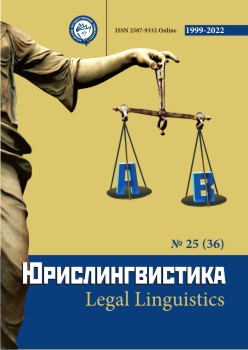Semantic Study of Materials on Extremism-Related Crimes through Data from the National Corpus of the Russian Language (Case Study of Comments on the Social Network VKontakte)
Abstract
The article concentrates on the study of the well-known call-slogan Beet the Jews, save Russia, which was published as a comment to the text in the social network "VKontakte". In the course of a preliminary study, it was found that this statement contains linguistic signs of motivation in the form of a call for active action against a group of people. However, it is not possible to say unequivocally which group of people these actions should be aimed at, since in the analyzed context (text-stimulus + text-reaction) it is possible to have a double understanding of the noun жид ‘Jew, Kike, Yid’: a group of people in relation to their nationality or a group of people, with which the greedy deputy is associated. To answer the question of whether the noun жид could really be used by the author of the disputed text in the meaning of a 'greedy person', data from the Russian national corpus were analyzed in the period from 2002 (herein Law N 114-FZ "On Couneraction of Extimist Fctivities" was enacted) through 2021. Linguistic analysis of the controversial text, analysis of the comments of the author of the controversial text to other stimulus texts, data from the Russian national corpus led to the conclusion that in the analyzed commentary the noun жид is used in the meaning of ‘Jew’. Consequently, the controversial text contains linguistic signs of expressing several types of meaning: humiliation of a group of persons in relation to their nationality; an inherent threat that poses a danger not to the addressee, but to third parties (Jews); inducements in the form of a call for violent actions against a group of persons in relation to their nationality.
Downloads
Metrics
References
Баранов А. Н. Лингвистическая экспертиза текста: теория и практика: учеб. пособие. М., 2007.
Баранов А. Н. Угроза в криминалистическом дискурсе (семантика и прагматика). М., 2021.
Бердникова Т. В. Определение адресованности побуждения в экстремистских материалах (на примерах из интернета) / Теория и практика судебной экспертизы. – 2019. – Том 14. – № 3. – С. 34–39.
Берков В. П., Мокиенко В. М., Шулежкова С. Г. Большой словарь крылатых слов и выражений русского языка: в 2-х т. Магнитогорск, 2014.
Большой толковый словарь русского языка / гл. ред. С. А. Кузнецов 2000. URL: http://gramota.ru/
Елистратов В. С. Словарь русского арго. Материалы 1980–1990 гг. М., 2000.
Зугумов З. М. Русскоязычный жаргон. Историко-этимологический толковый словарь преступного мира. М., 2014.
Квеселевич Д. И. Толковый словарь ненормативной лексики русского языка. М., 2005.
Кукушкина О. В., Сафонова Ю. А., Секераж Т. Н. Методика проведения судебной психолого-лингвистической экспертизы материалов по делам, связанным с противодействием экстремизму и терроризму. М., 2014.
Медиалингвистика в терминах и понятиях: словарь-справочник / под ред. Л. Р. Дускаевой. М., 2020.
Мельник Н. В. Лингвоперсонология политического интернет-комментария / Политическая лингвистика. 2017. № 5(65). С. 47–51.
Мокиенко В. М., Никитина Т. Г. Словарь русской брани. Матизмы, обсценизмы, эвфемизмы. СПб., 2003.
Национальный корпус русского языка. URL: https://ruscorpora.ru/new/index.html
Ожегов С. И. Толковый словарь русского языка / под ред. проф. Л. И. Скворцова. М., 2009.
Осадчий М. А. Русский язык на грани права: Функционирование современного русского языка в условиях правовой регламентации речи. М., 2013.
Плевако С. В., Куликова М. Г. Лингвистическая экспертиза: справочник для судей, следователей, адвокатов, доверенных представителей и патентных поверенных. М.; Барнаул, 2012.
Противодействие экстремистской деятельности: учебное пособие / отв. ред. А. М. Будаев. М., 2021.
Современный толковый словарь русского языка / под редакцией Т. Ф. Ефремовой. URL: https://bit.ly/3uVPeRa
Судебная экспертиза по делам о преступлениях экстремистской направленности: монография / О. Н. Матвеева, Н. В. Вязигина, М. М. Градусова [и др.]; под ред. О. Н. Матвеевой. Барнаул, 2016.
Толковый словарь русской разговорной речи. Вып. 1: А–И / М. Я. Гловинская, Е. И. Голанова [и др.]; отв. ред. Л. П. Крысин. М., 2014.
Ушаков Д. Н. Толковый словарь русского языка. URL: https://dic.academic.ru/dic.nsf/ushakov/800330
Федеральный закон от 25 июля 2002 года № 114-ФЗ «О противодействии экстремистской деятельности». URL: https://goo.gl/qn597W
Химик В. В. Толковый словарь русской разговорно-обиходной речи: в 2-х т. М., 2017.
Чернышова Т. В. Медиатекст и его место в структуре курса «Основы лингвоконфликтологии» / Медиалингвистика. – 2017. – № 3(18). – С. 53–63.
Щипицина Л. Ю. Жанровый статус сетевого комментария / Вестник Башкирского университета. Серия «Филология и искусствоведение». – 2015. – Т. 20. – № 2. – С. 528–531
The authors, which are published in this journal, agree to the following conditions:
1. Authors retain the copyright to the work and transfer to the journal the right of the first publication along with the work, at the same time licensing it under the terms of the Creative Commons Attribution License, which allows others to distribute this work with the obligatory indication of the authorship of this work and a link to the original publication in this journal .
2. The authors retain the right to enter into separate, additional contractual agreements for the non-exclusive distribution of the version of the work published by this journal (for example, to place it in the university depository or to publish it in a book), with reference to the original publication in this journal.
3. Authors are allowed to post their work on the Internet (for example, in a university repository or on their personal website) before and during the review process of this journal, as this may lead to a productive discussion, as well as more links to this published work (See The Effect of Open Access).











